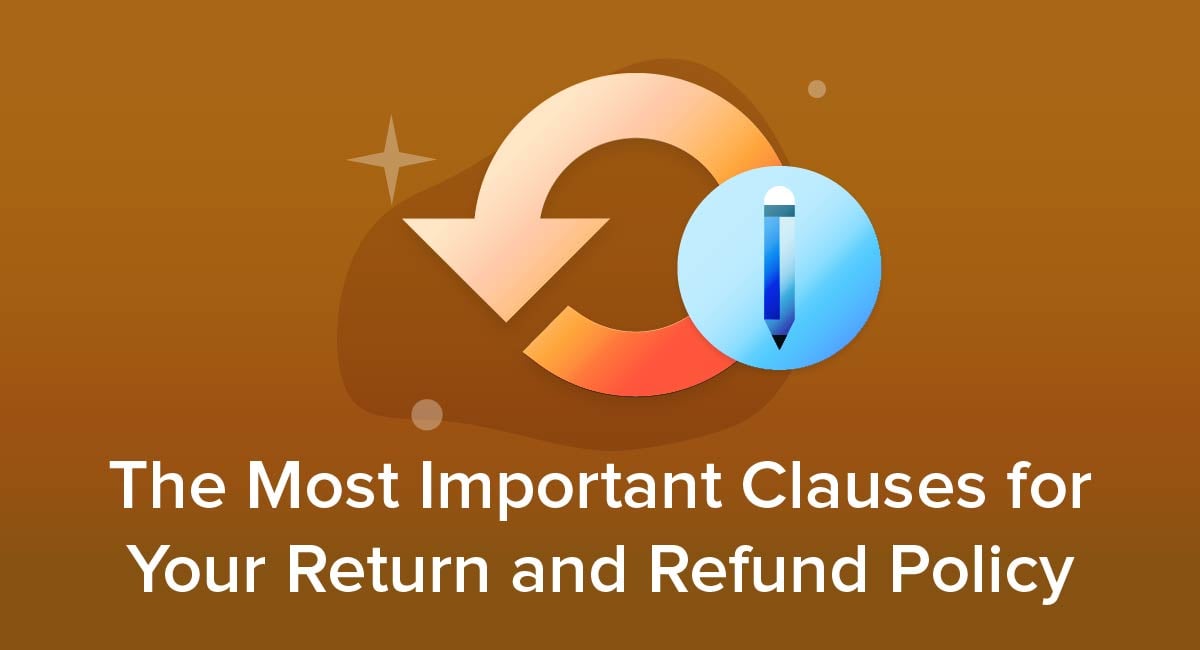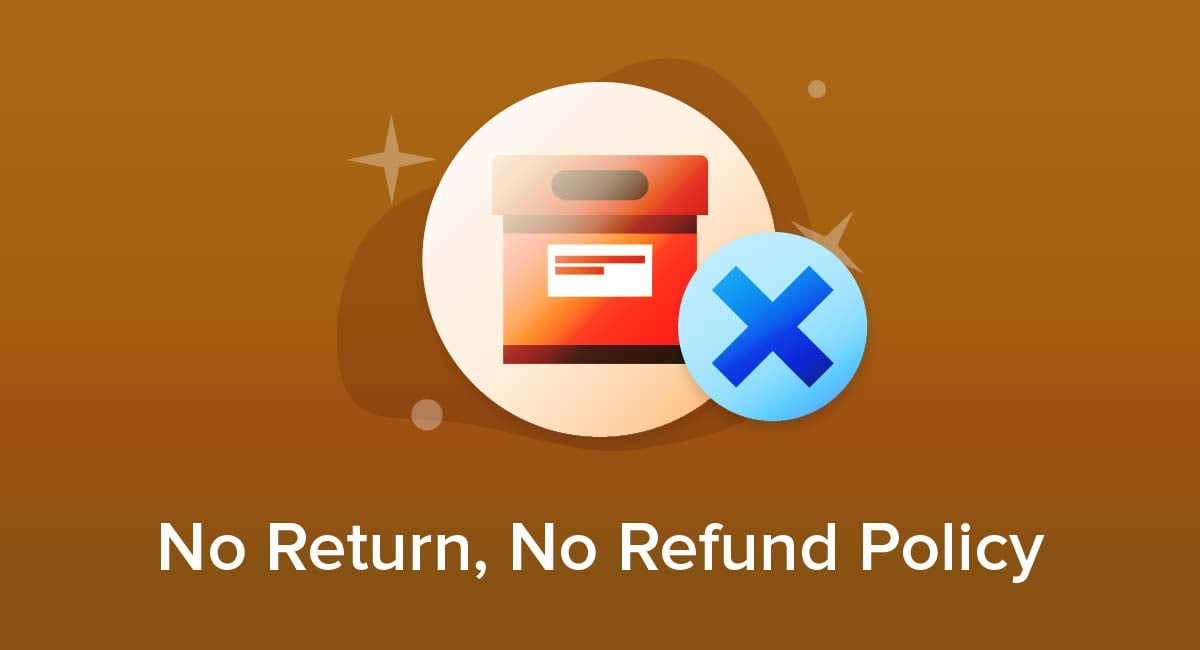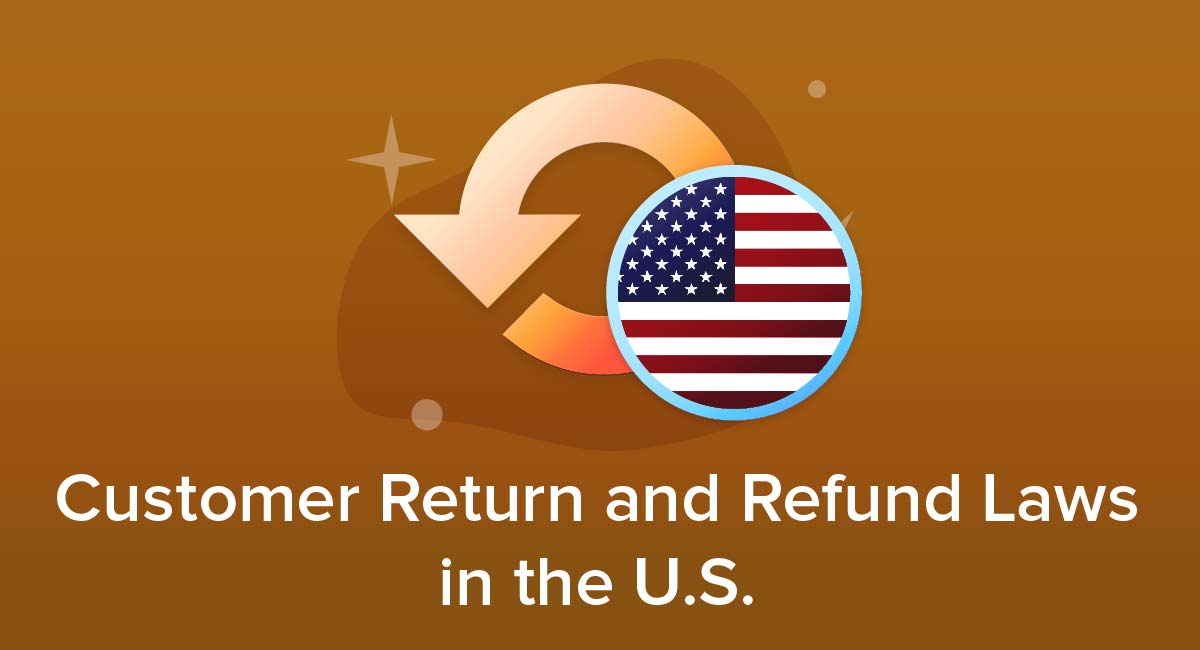
Customers asking to return items for a refund is a fact of life for most businesses, but your legal position often depends on your state.
While many states leave most elements of refunds up to sellers, others require refunds in some circumstances. Meanwhile some states let businesses set the rules but require clear disclosures of policies.
Here's what you need to know about return and refund laws in the United States.
Use FreePrivacyPolicy.com to generate the necessary legal agreements for your website/app:
- Free Privacy Policy Generator
- Free Terms and Conditions Generator
- Free Cookies Policy Generator
- Free Disclaimer Generator
- Free EULA Generator
- Free Return & Refund Policy Generator
You check our Free Cookie Consent to start making your business legally compliant with the Cookies Directive in the EU.
- 1. What are Return and Refund Laws?
- 2. National Return and Refund Laws in the U.S.
- 2.1. Implied Warranty: Merchantability
- 2.2. FTC Cooling-Off Rule
- 3. State Return and Refund Laws
- 3.1. California
- 3.2. Connecticut
- 3.3. Florida
- 3.4. Hawaii
- 3.5. Maryland
- 3.6. Massachusetts
- 3.7. Minnesota
- 3.8. New Jersey
- 3.9. New York
- 3.10. Ohio
- 3.11. Rhode Island
- 3.12. Utah
- 3.13. Vermont
- 3.14. Virginia
- 4. Summary
What are Return and Refund Laws?
Return and refund laws set out the ground rules about when and how customers can return goods for a refund. These laws may differ between two types of returns:
- When something is objectively wrong with the goods
- When the problem is subjective or personal, or the buyer has simply changed their mind about the purchase
Your business may (and usually should) have a Return and Refund Policy that sets out the way you handle refund requests. Laws can affect this policy in two ways:
- They may restrict what measures you include in the policy
- They may require you to display the policy prominently to make particular measures valid and binding on the customer, particularly when you limit refunds
National Return and Refund Laws in the U.S.

Two types of rules apply nationally and thus work alongside any state law that may apply.
Implied Warranty: Merchantability
This is part of federal law as Section 2-314 of the Uniform Commercial Code. It's the key law that requires businesses to offer refunds when something is objectively wrong with the goods.
This part of the law says that whenever you sell goods, there's an implied sales contract condition that means they must be "merchantable." The definition of "merchantable" includes that the goods must:
- Be of "fair average" quality
- Be fit for their usual purpose
- Conform to any promises you make in packaging and labelling
If the goods are not merchantable, you have effectively breached your contract with the customer. They therefore have the right to return the goods and receive a refund, thus restoring them to the position they were in before the contract.
While you could leave it up to the customer to take legal action to enforce this, doing so could be costly as you may have to cover their legal expenses. It could also significantly harm your reputation.
Note: Having a Warranty Policy can help you outline your warranty in further detail, including your warranty disclaimers.
FTC Cooling-Off Rule
This applies to cases where the customer has changed their mind about the purchase. It's much more limited than the implied warranty of merchantability.
The rule can apply to purchases of $25 or more made in a customer's home, or purchases of $130 or more made at a temporary location such as a hotel, fairground or convention center but not your regular place of business or stores.
The purchase must be for goods or services for personal, family or household use. The rule doesn't cover home repairs or maintenance, real estate, insurance, or securities. It also doesn't cover vehicles sold at a temporary location if you also have a permanent business location.
When the rule does apply, you must give the customer a contract and two copies of a cancellation form and tell them they have the right to cancel.
The customer can then cancel the purchase and get a refund until the end of the third day after the sale, not including Sundays or federal holidays. If they exercise this right, you must issue a refund within 10 days.
Some states have mirrored the measures of the FTC rule in their own laws. However, as long as it remains in force, the FTC rule applies in every state.
State Return and Refund Laws

Not all states have returns and refund laws. In these cases, the two national laws mentioned above apply. Beyond this, it is up to the seller to decide if and when they accept returns and issue refunds.
These states will not be noted in the list below.
Some states do have specific laws, usually covering returns where there's a subjective problem or the buyer changes their mind. We've detailed them below, but they generally fall into two main categories:
- You must accept returns and issue refunds in specific circumstances
- You must accept returns and issue refunds unless you clearly display a notice or have a clear policy that limits if or how you offer refunds
A standard way to meet the policy requirement is to have and conspicuously display a Return and Refund Policy page.
California
The relevant law is section 1723 of the state civil code.
Under the law, you have two options:
-
You can have a policy to issue a full cash refund, credit refund or equal exchange (i.e. for the same product) for at least seven days, for any reason. You can insist on a proof of purchase.
-
You can have a different policy (for example one that's more restrictive) but you must conspicuously display this policy. At a minimum, this must cover:
- What type of refund you give (cash/credit/exchange)
- The time period
- What types of goods are covered
- Any other conditions
If you break any part of these rules, the customer has the right to return goods for 30 days after purchase.
The main exception is that these rules don't apply to:
- Food or other perishable goods
- Customized goods
- Anything sold using the language "all sales final," "no returns accepted" or similar wording
Here's how California Kisses details the key refund information including what it doesn't refund, what what items aren't allowed to be returned:
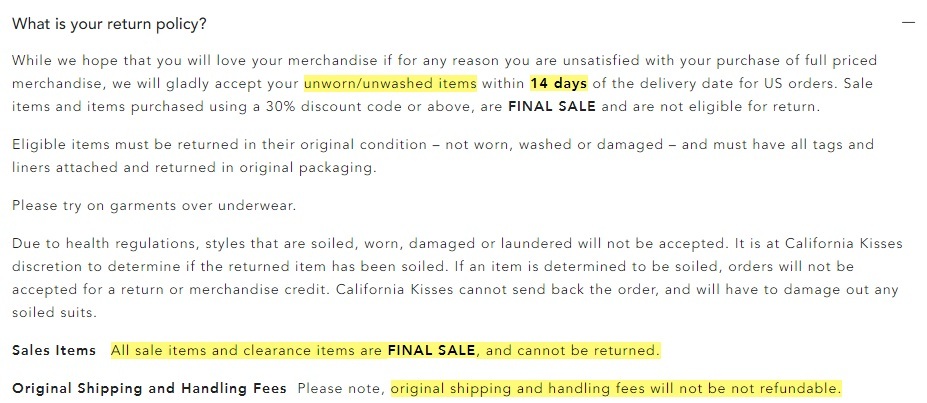
Connecticut
The relevant rules are detailed by the Department of Consumer Protection.
The key point is that you can set your own policy around returns and refunds, but it must be displayed conspicuously. If you don't do this, customers have the right to return unused items with a proof of purchase for up to seven days and get a refund.
The main exception is that these rules don't apply to:
- Food or other perishable goods
- Customized goods
- Anything sold using the language "all sales final," "no returns accepted" or similar wording
- Items without a proof of purchase
Here's how Hilti notes relevant information regarding returns:

Florida
The relevant law is 501.565 of the 2022 Florida Statutes.
The key point is that although you can generally set your own policy around returns and refunds, special rules apply to purchases that follow a "commercial telephone solicitation" or a marketing call.
In these cases, the customer can get a refund for any reason within seven days of the purchase. The customer must either send a written request or send the goods back, with the postmark falling within the seven-day period.
Hawaii
The relevant law is section 481B-5.5 of the Hawaii Revised Statutes.
Under the law you can use one of four basic returns policies:
- You only offer refunds
- You offer a choice of refunds or credit
- You offer a choice of an exchange or credit
- You do not offer any form of refund, exchange or credit
You should conspicuously post a Return and Refund Policy. If you don't, several default rules will apply:
- You must accept returns and offer refunds unless you post a policy
- Returns are allowed for 60 days after purchase unless your policy lists a shorter deadline
- You cannot exclude types of merchandise from refunds unless you say so in the policy
If you give a customer credit after a return, they normally have the right to get a cash refund if they can't use the credit to buy a suitable replacement item within 30 days. (For example, you may no longer stock the item.) You can only avoid this rule if you say so in your posted policy.
Hanapa'a Fishing's Return Policy complies with the law by confirming it offers refunds:
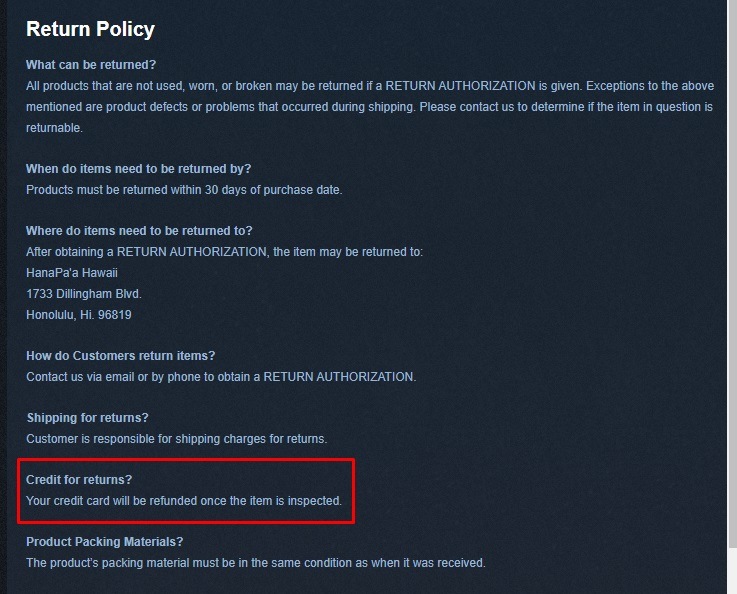
Maryland
The relevant rules are detailed by the state Attorney General.
The key principle is that you can have any returns policy you like as long as you post them conspicuously or include it in the receipt. (This doesn't override the federal laws such as the implied warranty of merchantability.) Your Return and Refund Policy must detail any limitations.
If you don't make your policy available, the default position is that the customer has the right to get a refund if they return an item in good condition within a "reasonable" period. Perishable and customized items are excluded from this.
By posting a clear policy, United Gun Shop is able to set its own time limit on returns:

Massachusetts
The relevant law is the Code of Massachusetts Title 940 Section 3.13.
The key point is that you can set your own policy on returns and refunds. However, you must:
- Clearly and conspicuously disclose the policy before the purchase
- Not misrepresent any terms in your policy
- Abide by any promises you make in your policy
Failing to do this is considered an unfair and deceptive trade practice. Under Massachusetts law, this could mean the customer can sue you for damages.
The Marshfield Hills General Store complies by publishing a clear and detailed Refund Policy:
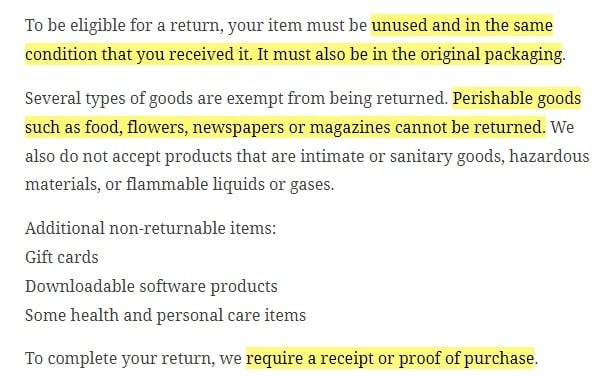
Minnesota
The relevant law is section 325.80 of the Minnesota Statutes.
The key point is that you can only have your own policy regarding returns and refunds if you clearly and conspicuously display them as a written policy on your premises (or website) in boldface type of at least 14 points.
If you don't do this, default rules apply saying you must give a cash refund if a consumer returns the goods:
- With a reasonable time after purchase
- In an acceptable condition, and
- With proof of purchase
A "cash refund" means you must pay by cash, check or a refund to the payment card account.
The General Store of Minnetonka's Return Policy is lawful when displayed correctly in stores:
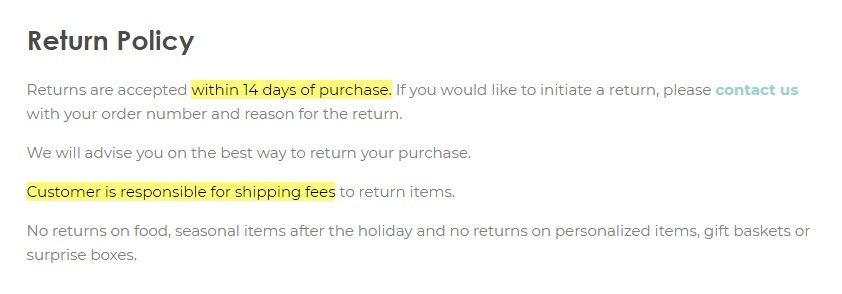
New Jersey
The relevant law is the Consumer Fraud Act.
The key point is that you must post a Return and Refund Policy in at least one of the following ways:
- Attached to the item
- Attached to every cash register
- Within sight of every cash register
- At every story entrance
In an ecommerce world, this means you must have your policy displayed somewhere conspicuously such as in the website's footer.
The policy must state:
- Whether you give refunds
- Whether you have an exception for goods advertised as on "sale" or "as is"
- Whether you require a proof of purchase
- Whether you have a time limit for when returns can be made
- How you issue refunds
If you breach any of these rules, the customer has an automatic right to return unused and undamaged goods within 20 days of purchase. The customer can then choose whether to accept a cash refund or credit.
Motorcycle Mall covers all the key points below:
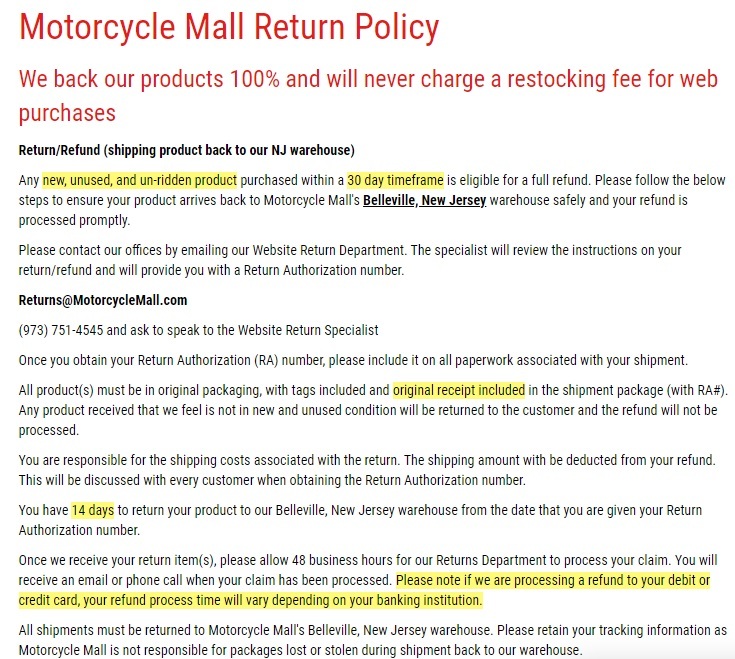
New York
The relevant law is section 218-a of the New York General Business Law.
The key point is that you must post a Return and Refund Policy that includes:
- Whether you have an exception for goods advertised as on "sale" or "as is"
- Whether you require a proof of purchase
- Whether you have a time limit
- How you issue refunds
- Whether you charge any restocking fees
If you don't post a policy, the consumer gets a default right to a refund if they return the goods unused and undamaged, with a receipt of other proof of purchase, within 30 days. The customer can choose whether to accept a cash refund or credit.
The New York Public Library Shop covers all the key points:
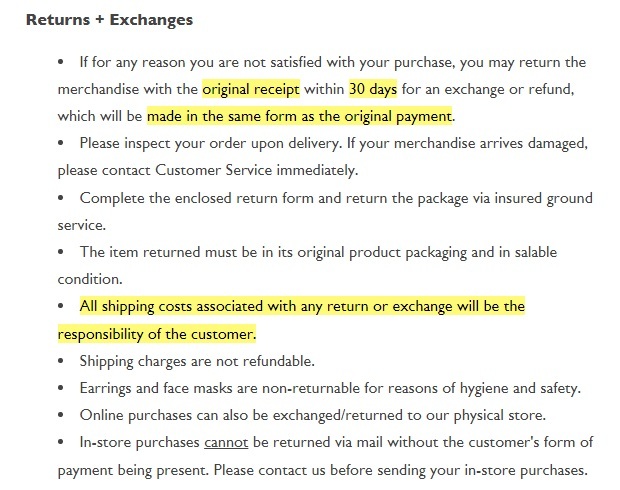
Ohio
The relevant law is chapter 1345 of the Ohio State Code.
The key point is that you must post your policy on returns and refunds. If you don't, the customer has the right to a refund when returning an item.
The law does have two special rules that always override your policy:
- If you're a licensed hearing aid dealer, customers have the right to return hearing aids for refund for 30 days after purchase.
- Customer can cancel a contract for three days after starting service with a "prepaid entertainment contract." (This assumes the service starts immediately upon agreeing the contract. If this isn't the case, the deadline is extended to seven days after the service starts.)
By publishing a Return and Refund Policy, The Bobcat Store is able to set its own terms:
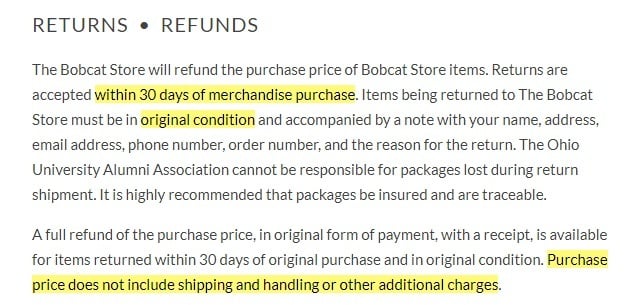
Rhode Island
The relevant law is chapter 27 of title 6 of the Commercial Law - General Regulatory Provisions.
The key point is that you must publish a notice (by the displayed goods, at the cash register or at the store entrance) if you don't accept returns.
If you don't publish a notice, the customer has the right to return the item within 10 days with proof of purchase and get a refund by the same method they used to pay.
Perishable items, custom items and publications are exempt from this rule.
By publishing a Return Policy, Re is able to shorten the returns period:
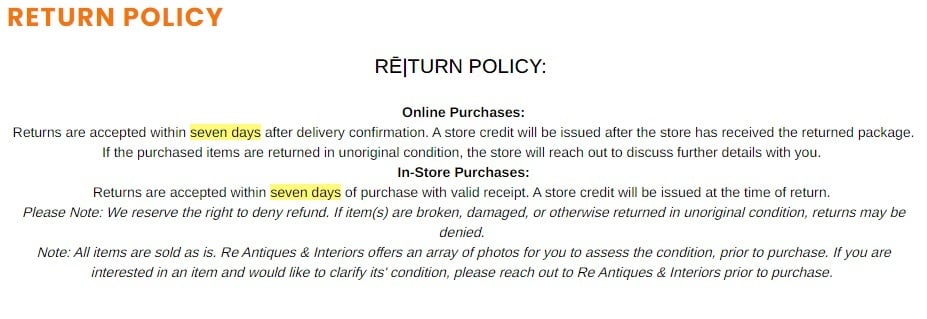
Utah
The relevant law is section 151-11-10 of the Utah Administrative Code.
The key point is that you must issue refunds unless you post a policy stating otherwise in one of the following ways:
- A sign at the store entrance, point of sale or by the displayed goods
- Through "adequate verbal or written disclosure" for non-store sales such as by phone or online
- On the first page of a sales contract
You can refuse returns and refunds on goods that you clearly mark sold "as is" with a clear "no refunds" statement.
Perishable and customized goods are exempt from these rules.
By publishing a clear Return Policy, the Campus Store of the University of Utah can impose extensive conditions on returns and refunds:

Vermont
The relevant law is consumer protection rule 106.1.
The key point is that you must normally offer a cash refund on any goods returned in unused condition "within a reasonable time."
The only way to avoid this requirement is if you publish a conspicuously placed sign that says you don't offer refunds or do so at your discretion.
The rules don't apply to perishable or customized goods or those which it is illegal to resell.
By publishing a clear Return and Refund Policy, The Vermont Book Shop can retain the right to offer credit or exchanges rather than a cash refund:
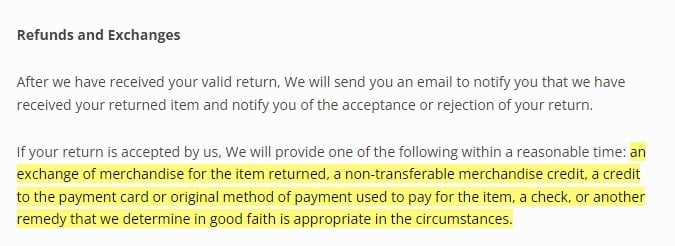
Virginia
The relevant law is the Virginia Consumer Protection Act.
The key point is that you must normally post a policy that states whether you accept returns or refunds and whether you impose any conditions or fees. The policy must be "readily noticeable and readable" by the customer when making a purchase.
You don't have to post a policy if you offer returns and refunds for at least 20 days after purchase. You can require proof of purchase and that the goods be unused and undamaged.
Posting a Return Policy allows the Virginia Furniture Company to restrict the return period to 7 days:

Summary
Let's recap what you need to know about returns and refund laws in the United States.
Returns and refund laws cover how and when customers can return goods.
Federal law means all sales inherently involve an "implied warranty of merchantability" meaning you promise the goods will work as described. If the goods are faulty, you must offer a refund. This applies in all states.
A Federal Trade Commission gives customers limited rights to cancel a purchase within three days and get a refund. This mainly involves sales in a customer's home or at a temporary location such as an exhibition or fair. It doesn't cover sales in a store.
Many states have no returns and refund laws. In these cases, it's up to you to decide if and when you accept returns and issue refunds on non-faulty goods.
Some states have returns and refund laws:
- California: Refund for returns within 7 days unless you display a policy saying otherwise
- Connecticut: Refund for returns within 7 days unless you display a policy saying otherwise
- Florida: Refund for returns within 7 days for purchases following a marketing phone call. No rules on returns for other sales.
- Hawaii: The default rules are refunds for 60 days with no types of goods exempted. You can vary any of these rules but only if you publish a policy to that effect.
- Maryland: Refund for returns within "a reasonable period" unless you display a policy saying otherwise.
- Massachusetts: You can set your own policy but must display it before purchase.
- Minnesota: Refund for returns within "a reasonable period" unless you publish a policy saying otherwise. This must be in boldface type and at least 14 points.
- New Jersey: You must clearly display a policy covering key points. If not, customers can get a refund for returns within 20 days.
- New York: Refund for returns within 30 days unless you display a policy saying otherwise.
- Ohio: Customers have a right to returns and refunds unless you post a policy stating otherwise.
- Rhode Island: Refund for returns within 10 days unless you display a policy saying otherwise.
- Utah: Customers have a right to returns and refunds unless you post a policy stating otherwise.
- Vermont: Refund for returns within "a reasonable period" unless you display a policy saying otherwise.
- Virginia: You must post a policy, including mentioning any fees, unless you offer a refund for returns for at least 20 days.
With most of these laws, the default right to returns only applies to undamaged and unused goods. Most laws exempt perishable and customized goods from the rules.
The best way to ensure your policies are enforceable is to always have and display a Return and Refund Policy.
